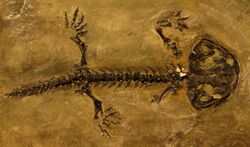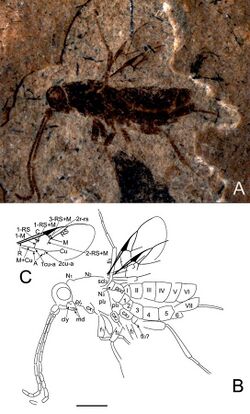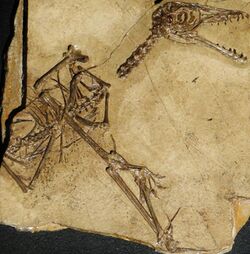Earth:Karabastau Formation
| Karabastau Formation Stratigraphic range: Middle Jurassic - Late Jurassic Callovian–Kimmeridgian | |
|---|---|
 Specimen of the salamander Karaurus sharovi | |
| Type | Geological formation |
| Area | Karatau Mountains |
| Thickness | 26 m (85 ft) exposed |
| Lithology | |
| Primary | Claystone dolomite, |
| Other | Sandstone, conglomerate |
| Location | |
| Region | Central Asia |
| Country | |
The Karabastau Formation (Kazakh: Qarabastaý svıtasy) is a geological formation and lagerstätte in the Karatau Mountains of southern Kazakhstan whose strata date to the Middle to Late Jurassic. It is an important locality for insect fossils that has been studied since the early 20th century, alongside the rarer remains of vertebrates, including pterosaurs, salamanders, lizards and crocodiles.[1][2]
Lithology and depositional environment
The primary lithology consists of 1 mm thick varve laminations of claystone, with a dark part and a light dolomitic part, which probably correspond to a wet and dry season respectively, alongside rare, several cm thick sandstone interbeds. These were deposited within an ancient freshwater paleolake, that given the number of laminations has been suggested to have existed for over 150,000 years. The top of the formation shows the laminations becoming wavy, likely as a result of microbial interactions, and the top of the formation is capped by a conglomerate predominantly composed of black Carboniferous limestone pebbles.[2]
History of discovery
The Karabastau Formation was first discovered in 1921 by Soviet geologists, and was declared a protected paleontological reserve in 1924.[2]
Paleofauna
Vertebrates
| Genus | Species | County | Member | Abundance | Notes | Images |
|---|---|---|---|---|---|---|
|
Batrachognathus |
B. volans |
2 specimens |
An Anurognathid Pterosaur. |
|||
|
K. sharovi |
An Atoposaurid Crocodylomorph. | |||||
|
K. sharovi |
stem-group salamander. | |||||
| Praeornis | P. sharovi | 2 specimens | Proto-Feather | |||
| Sharovisaurus | S. karatauensis | A Paramacellodid lizard | ||||
|
Sordes |
S. pilosus | 8 specimens |
A Pterodactylomorph Pterosaur. | |||
| Yaxartemys | Y. longicauda | Turtle, possibly belongs to Xinjiangchelyidae | ||||
| Morrolepis | M. aniscowitchi | 346 specimens | Coccolepidid fish[3] | |||
| Pteroniscus | P. turkestanensis | Palaeonisciform fish, closely related to Uighuroniscidae and Daqingshaniscus.[3] | ||||
| Spherosteus | S. scharovi | Peipiaosteid fish, related to sturgeons and paddlefish |
Invertebrates
Hundreds of species of insects are known from several localities within the formation, primarily Karatau-Mikhailovka[4][5][6][7][8][9][10][11][12][13]
Flora
| Genus | Species | County | Member | Abundance | Notes | Images |
|---|---|---|---|---|---|---|
| Williamsoniella | Williamsoniella karataviensis | Bennettitales | ||||
| Weltrichia | Weltrichia auliensis | |||||
| Ptilophyllum | ||||||
| Otozamites | ||||||
| Brachyphyllum | Conifer | |||||
| Pagiophyllum |
See also
- List of pterosaur-bearing stratigraphic units
- List of fossiliferous stratigraphic units in Kazakhstan
References
- ↑ Barrett, P.M., Butler, R.J., Edwards, N.P., & Milner, A.R. Pterosaur distribution in time and space: an atlas. p61-107. in Flugsaurier: Pterosaur papers in honour of Peter Wellnhofer. 2008. Hone, D.W.E., and Buffetaut, E. (eds). Zitteliana B, 28. 264pp.[1]
- ↑ 2.0 2.1 2.2 Dzik, Jerzy; Sulej, Tomasz; Niedźwiedzki, Grzegorz (2010-07-14). "Possible link connecting reptilian scales with avian feathers from the early Late Jurassic of Kazakstan" (in en). Historical Biology 22 (4): 394–402. doi:10.1080/08912961003710616. ISSN 0891-2963.
- ↑ 3.0 3.1 Skrzycka, Roksana (2014-07-03). "Revision of two relic actinopterygians from the Middle or Upper Jurassic Karabastau Formation, Karatau Range, Kazakhstan" (in en). Alcheringa: An Australasian Journal of Palaeontology 38 (3): 364–390. doi:10.1080/03115518.2014.880267. ISSN 0311-5518.
- ↑ "Karabastau Formation". https://paleobiodb.org/classic/displaySearchStrataResults?group_formation_member=Karabastau.
- ↑ "Karatau-Galkino (PIN collection 1789)". https://paleobiodb.org/classic/basicCollectionSearch?collection_no=31311&is_real_user=.
- ↑ "Karatau-Mikhailovka (PIN collection 2997)". https://paleobiodb.org/classic/basicCollectionSearch?collection_no=105426.
- ↑ "Karatau-Mikhailovka (PIN collection 2554)". https://paleobiodb.org/classic/basicCollectionSearch?collection_no=105970&is_real_user=.
- ↑ "Karatau-Mikhailovka (PIN collection 2066)". https://paleobiodb.org/classic/basicCollectionSearch?collection_no=105971&is_real_user=.
- ↑ "Karatau-Mikhailovka (PIN collection 2239)". https://paleobiodb.org/classic/basicCollectionSearch?collection_no=106101&is_real_user=.
- ↑ "Karatau-Mikhailovka (PIN collection 2384)". https://paleobiodb.org/classic/basicCollectionSearch?collection_no=106102.
- ↑ "Karatau-Mikhailovka (PIN collection 2904)". https://paleobiodb.org/classic/basicCollectionSearch?collection_no=106279&is_real_user=.
- ↑ "Karatau-Mikhailovka (PIN collection 2784)". https://paleobiodb.org/classic/basicCollectionSearch?collection_no=113439&is_real_user=.
- ↑ "Karatau-Galkino (PIN collection 2452)". https://paleobiodb.org/classic/basicCollectionSearch?collection_no=115717&is_real_user=.
 |




